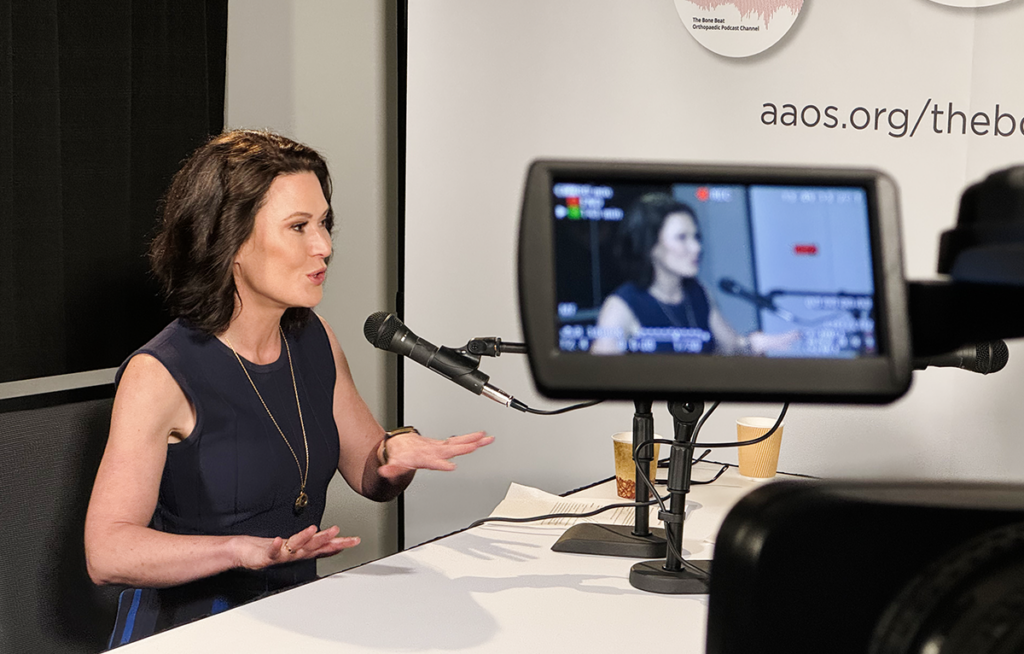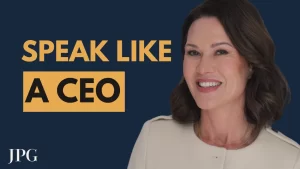Recently, I spoke at the annual meeting of the American Academy of Orthopaedic Surgeons (AAOS). At our media training workshop, we had over a dozen surgeons—dedicated professionals and perfectionists. These surgeons strive for excellence in everything. That’s great, and it can be crippling when you need to talk to your audience and connect with them.
When it comes to media interviews and public speaking, it’s not just about perfection or having all the facts. It’s about telling your story in a way that captivates and engages your audience.
Lean into Your Executive Presence
First, take control of your executive presence with the goal of inspiring confidence in others. Think about this from a patient’s perspective. As a patient, I want to have confidence in the person taking care of me. I want to know you have my back.
Executive presence is about composure. Do you make people feel calm? Do you look like you’re in control of your body language, your breathing, and your posture? It’s also about your character.
Your Achievements Don’t Speak for Themselves
Many physicians don’t see themselves as executives. Despite having numerous degrees and qualifications, they often assume that their achievements speak for themselves. A few months ago, I explained to a client the importance of appearance. She was puzzled at first, not seeing the connection. She was qualified for the job—why would I even bring up her outfit or hairstyle?
I’m not suggesting you need to look like a news anchor. But when you’re on camera, your appearance can evoke trust. Media interactions are performative; it’s not just about your credentials. First impressions matter. Your audience forms an opinion the moment they see you, and then it’s your chance to captivate them with your 60-second elevator pitch.
This concept applies not just to media interviews but also to other professional opportunities, like applying for medical awards, department head positions, and prestigious fellowships. When you walk into an interview or step onto a stage, you need to project confidence and credibility. It’s about showcasing the whole package: your expertise, your professionalism, and your executive presence. Your story, combined with your polished appearance and demeanor, can make you memorable and compelling, setting you apart from others with similar qualifications.
Your Story Completes Your Resume
Your resume may be impressive, but it’s your story that will make you stand out. You’re probably great at your job. Or maybe you’re at the top of your class. But is that always enough?
A lot of students and clients come to us with the same question: “Why haven’t I gotten…?” Residency, fellowship—the thing they want.
I tell them to take a step back. Go back and remember what attracted you to medicine (or whatever industry you’re in). What is the story you can tell?
That way, when you interview for something, someone will remember you five days later and say, “I’m going to hire this person.” “I want her to do the presentation.” “I want him to speak at the conference.”
How to Nail Down Your Story
- Focus on Your Story and HOW You Tell It: Crafting a compelling narrative is more than just recounting your experiences; it’s about how you present them. Your story should be engaging and memorable, drawing people in and making them want to know more about you.
- Reflect on Your Journey: What inspired you to pursue your profession? Think about the challenges you’ve overcome and the defining moments along your path. These experiences not only shape who you are but also make your story unique.
- What Makes YOU DIFFERENT?: Identify what sets you apart from others in your field. What unique perspectives or experiences do you bring to the table? Highlight these aspects to showcase your individuality and make a lasting impression.
- Connect with Your Audience: Consider who you’re speaking to, whether it’s patients, colleagues, or an interview panel. Tailor your story to resonate with them. What parts of your journey will they find most compelling or relatable?
- Practice Your Delivery: Like any skill, storytelling improves with practice. Rehearse your story to ensure it flows naturally and confidently. Pay attention to your tone, body language, and pacing to keep your audience engaged.
- Stand Out in a Crowd: After meeting 10-15 other people, what will make someone remember you? It’s the personal touch in your story, the emotion you convey, and the authenticity you bring to the conversation. Your story, when well-told, can leave a lasting impression that goes beyond your qualifications and achievements.
Your brand isn’t just what you look like on social media, it’s also the stories you tell when you walk into a room. The way you present yourself captivates the audience, whether it’s a patient or a room full of colleagues.
Conclusion
What is the story you tell that will allow you to land the thing you really want? What is your unique connection?
Listen to the entire podcast here for more practical guidance on adapting to your audience, looking polished, and managing your inner dialogue to effectively promote your personal brand and your practice.
Reach out to us today, and let us help you tell your story, which will complete your resume and give you executive presence.




